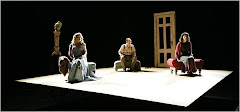
· SJean-Paul Sartre was born in Paris and his father died when he was only fifteen months old and thus his mother became a major influence upon his life.
· In his childhood Sartre portrayed brilliance in the classroom, however his behavior was often unpredictable and arrogant.
· From 1931-1945 he worked as a teacher and he also traveled to foreign countries during this period, such as Egypt, Greece, and Italy
· In 1933-1934 he studied in Berlin under the writings of German philosophers Edmund Husserl and Martin Heidegger
· He was drafted in 1939 and then imprisoned a year later in Germany, however he was released or escaped in 1941
· Sartre then joined a resistance movement in Paris and wrote for magazines such as, Les Lettres Francaise and Combat
· Sartre attempted to reconcile existentialism and Marxism with the French Communist Party, although he was never a member
· Sartre was an exponent of atheistic existentialism
· “Sartre’s WWII experience is an example of what existentialists see as the ever present necessity for individual choice. His was a very obvious case in point, a choice which all Frenchmen faced at the time: collaboration, resistance, or quite self preservation” (http://www.blupete.com/Literature/Biographies/Philosophy/Sartre.htm)
· Sartre portrays human life as an “unhappy consciousness” a “useless passion” and that our emotions are not outside of the control of our wills
· "There is no ultimate meaning or purpose inherent in human life; in this sense life is 'absurd'. We are 'forlorn', 'abandoned' in the world to look after ourselves completely. Sartre insists that the only foundation for values is human freedom, and that there can be no external or objective justification for the values anyone chooses to adopt”
(http://www.blupete.com/Literature/Biographies/Philosophy/Sartre.htm)
Cites/Sources:
http://www.blupete.com/Literature/Biographies/Philosophy/Sartre.htm
http://www.philosophypages.com/ph/sart.htm
http://www.kirjasto.sci.fi/sartre.htm
· In his childhood Sartre portrayed brilliance in the classroom, however his behavior was often unpredictable and arrogant.
· From 1931-1945 he worked as a teacher and he also traveled to foreign countries during this period, such as Egypt, Greece, and Italy
· In 1933-1934 he studied in Berlin under the writings of German philosophers Edmund Husserl and Martin Heidegger
· He was drafted in 1939 and then imprisoned a year later in Germany, however he was released or escaped in 1941
· Sartre then joined a resistance movement in Paris and wrote for magazines such as, Les Lettres Francaise and Combat
· Sartre attempted to reconcile existentialism and Marxism with the French Communist Party, although he was never a member
· Sartre was an exponent of atheistic existentialism
· “Sartre’s WWII experience is an example of what existentialists see as the ever present necessity for individual choice. His was a very obvious case in point, a choice which all Frenchmen faced at the time: collaboration, resistance, or quite self preservation” (http://www.blupete.com/Literature/Biographies/Philosophy/Sartre.htm)
· Sartre portrays human life as an “unhappy consciousness” a “useless passion” and that our emotions are not outside of the control of our wills
· "There is no ultimate meaning or purpose inherent in human life; in this sense life is 'absurd'. We are 'forlorn', 'abandoned' in the world to look after ourselves completely. Sartre insists that the only foundation for values is human freedom, and that there can be no external or objective justification for the values anyone chooses to adopt”
(http://www.blupete.com/Literature/Biographies/Philosophy/Sartre.htm)
Cites/Sources:
http://www.blupete.com/Literature/Biographies/Philosophy/Sartre.htm
http://www.philosophypages.com/ph/sart.htm
http://www.kirjasto.sci.fi/sartre.htm


No comments:
Post a Comment